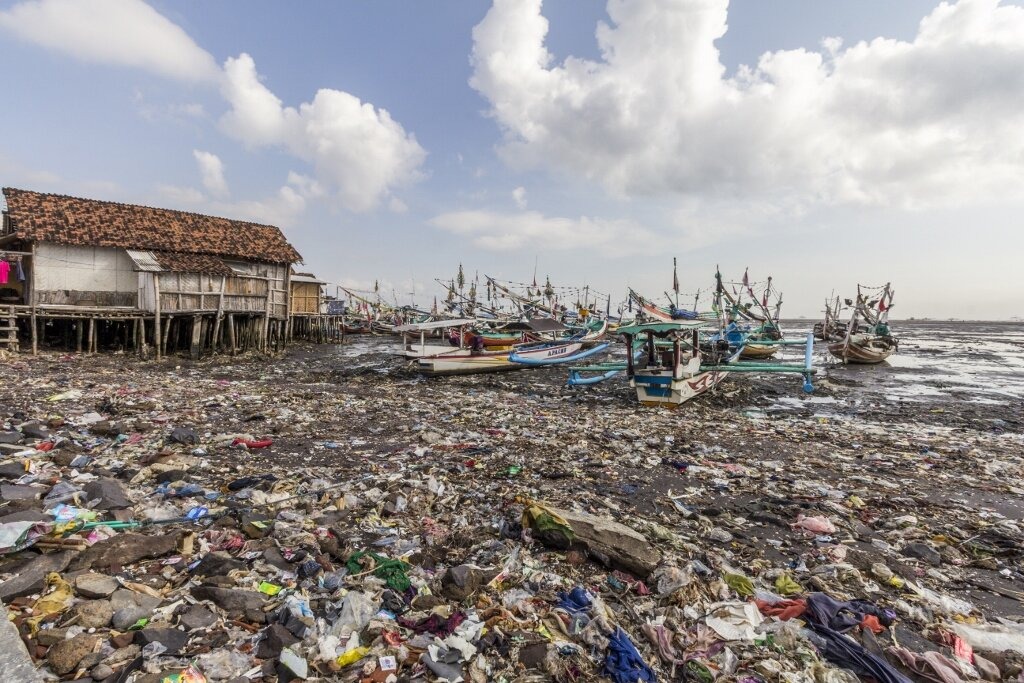Indonesia has released one of the world’s most ambitious plans to combat plastic pollution and waste.
A radical system change approach could lead the nation not only to doubling its recycling capacity but also cutting out 1 million tonnes of avoidable plastics and curbing 20 million tonnes of greenhouse gas emissions every year. Public, private, and civil society change-makers in Indonesia are working to implement the action plan, developed through the Global Plastic Action Partnership (an initiative led by the World Economic Forum).
The strategy document, ‘Radically Reducing Plastic Pollution in Indonesia: A Multi-Stakeholder Action Plan‘, lays out an evidence-based roadmap to reduce the amount of plastic leakage into Indonesia’s oceans by 70% by 2025, as well as achieving near-zero plastic pollution by 2040 through transitioning to a circular economy for plastics.
Building the roadmap
The analysis and scenario methodology for developing the Action Plan were adapted from global research conducted by The Pew Charitable Trusts and SYSTEMIQ, which will be published in full later this year as ‘Breaking the Plastic Wave’. The Action Plan was also shaped through close collaboration with leading plastic waste and pollution experts in Indonesia, including members of the Indonesia National Plastics Action Partnership (NPAP) Steering Board, NPAP Expert Panel, Government of Indonesia, and other key stakeholders.
“This plan shows how we can be free from plastic waste within a generation”, explained Arthur Neeteson, SYSTEMIQ’s Director of Venture Development in Indonesia, whose team wrote the NPAP report. “Plastics have many valuable uses in our society, but it’s possible to have the same economic growth, convenience and affordability while using less.”
System change in action
Over 160 million Indonesians have no regular access to home waste collection, and the country produces 6.8 million tons of waste plastic every year, over half of which is burned or dumped, or finds its way into the water system. The plan envisages:
- reducing or substituting avoidable plastic usage to prevent the consumption of more than one million tonnes of plastics per year;
- redesigning plastic products and packaging with reuse or recycling in mind;
- doubling plastic waste collection to more than 80% by 2025;
- doubling current recycling capacity by 2025; and
- building or expanding controlled waste disposal facilities to safely manage non-recyclable plastic waste.
“A source of hope”
Indonesia’s Coordinating Minister for Maritime Affairs and Investment, Luhut B. Pandjaitan, welcomed the plan as a “source of hope and inspiration in these challenging times”.
“Plastic pollution is an issue that affects our nation deeply. It would destroy our pristine marine ecosystems, harms the livelihoods and health of our citizens, and stands in the way of our path towards a resilient future… We will not allow this looming crisis to continue to grow; instead, we are taking bold, decisive action at every level and across every sector in Indonesia.”
Kristin Hughes, the director of the Global Plastic Action Partnership and a member of the World Economic Forum’s executive committee, said: “Indonesia has shown us a world-class example of how to take on a complex issue.”
“In Indonesia and across the world, we are seeing the power of community as more crucial than ever – to come together in new and creative ways, to openly share our expertise and experience, and to act in unison to solve the most pressing issues that face us.”
Read the report, including its 10 critical accelerators for Indonesia’s reduction targets.
Watch the full digital launch of the plan.

